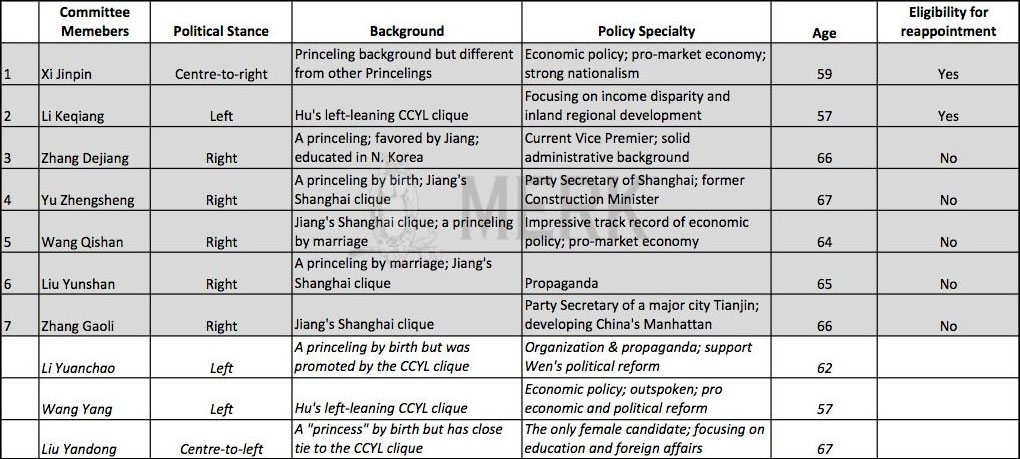Hu's Defeat vs. Jiang's Victory
We disagree with media reports that China's new Politburo Standing Committee is dominated by relatively conservative members. What we see is a complete defeat of current President Hu's Chinese Communist Youth League (CCYL) clique and a victory of retired President Jiang's Shanghai clique. In recent days, Jiang's unusually frequent and high-profile public appearances suggest he is still highly influencing policy making and senior official appointments.
As a result, except for new President Xi Jinping (not necessarily associated with any clique) and new Premier Li Keqiang (Hu's CCYL clique), all of the other five new committee members are considered associated with Jiang's Shanghai clique or favored by Jiang. In addition, current President Hu will unexpectedly no longer serve as military leader after stepping down from the position of Party leader.
Not Necessarily a Conservative Committee
We believe the reasons why some may consider the new committee as conservative are: 1) Zhang Dejiang, who was educated in North Korea, was appointed the 3rd on the committee, and 2) Candidates like Wang Yang, who has been outspoken and aggressively called for political reform and grassroots democracy, were not selected. We don't think it's necessarily the case that the new committee is so conservative. Newly appointed President Xi Jinping is known for his support for market-oriented reform. Unlike outgoing President Hu, who came from a humble family, Xi's princeling background (the privileged offspring of prominent figures in the revolution that brought the party to power in 1949) and political resources will enable him to push ahead reform.
In addition, the stances that China’s leaders hold are not necessarily the same on political and economic issues. Hu's CCYL clique, especially outgoing Premier Wen, firmly supports further political reform, but in terms of economic policies, they focus more on reducing regional imbalances and income disparity than on market reform. In contrast, Jiang's Shanghai clique tends to focus more on economic reform but they're more politically conservative.
Another Possible Reshuffle in 2017
According to current rule, Politburo Standing Committee members have to retire after turning 70. If the "retire-at-70" rule doesn't change, five of the seven members on the new committee will retire after the first five-year term. In 2017, there is likely to be another reshuffle on the committee; only President Xi and Premier Li will remain on the committee. Because retired President Jiang is already 86, he is very unlikely to maintain his current influence after five years. In addition, all of the five members who will not be eligible after 2017 are considered associated with Jiang. It's very likely, at that time, that outgoing President Hu plays a major role in appointing the next committee, and the policy priority may be changed accordingly.
The following table shows the composition and ranking of the new Politburo Standing Committee as well as their eligibility for reappointment according to current rule. The other three people were potential candidates but they were not selected this time.
By Axel Merk & Yuan Fang, Merk Investments
Source: Merk Funds






